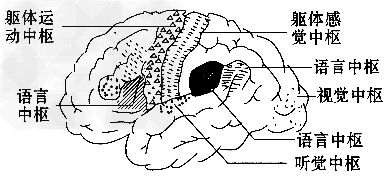问题
读图填空题
如图是大脑皮层神经中枢示意图,请据图回答:

(1)为体现“构建和谐社会”,关爱弱势群体,各城市都铺设了方便盲人行走的盲道,其上的突起使盲人通过足底皮肤中的________将刺激传至大脑皮层中的_______中枢,从而顺利完成行走动作。
(2)手被针扎后感到疼痛,这与图中的_______中枢有关。
(3)《星星,你好》是2008年北京残奥会开幕式上由聋哑人舞蹈演员表演的舞蹈,在这个过程中,听障演员参与的中枢必须有__________________________________________。
(4)在人体中,除大脑皮层外,在_______部位也存在着神经中枢(写出两个部位即可)。
答案
(1)感受器;躯体感觉
(2)躯体感觉
(3)视觉中枢、躯体运动中枢和语言中枢
(4)脑干和脊髓
